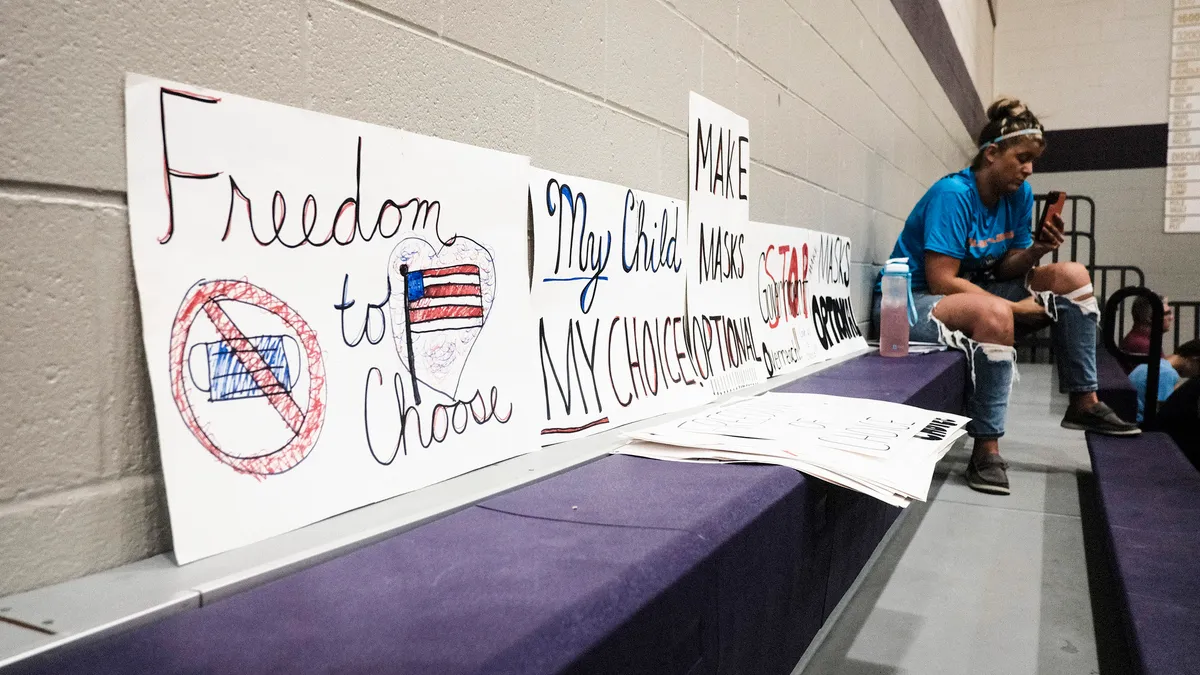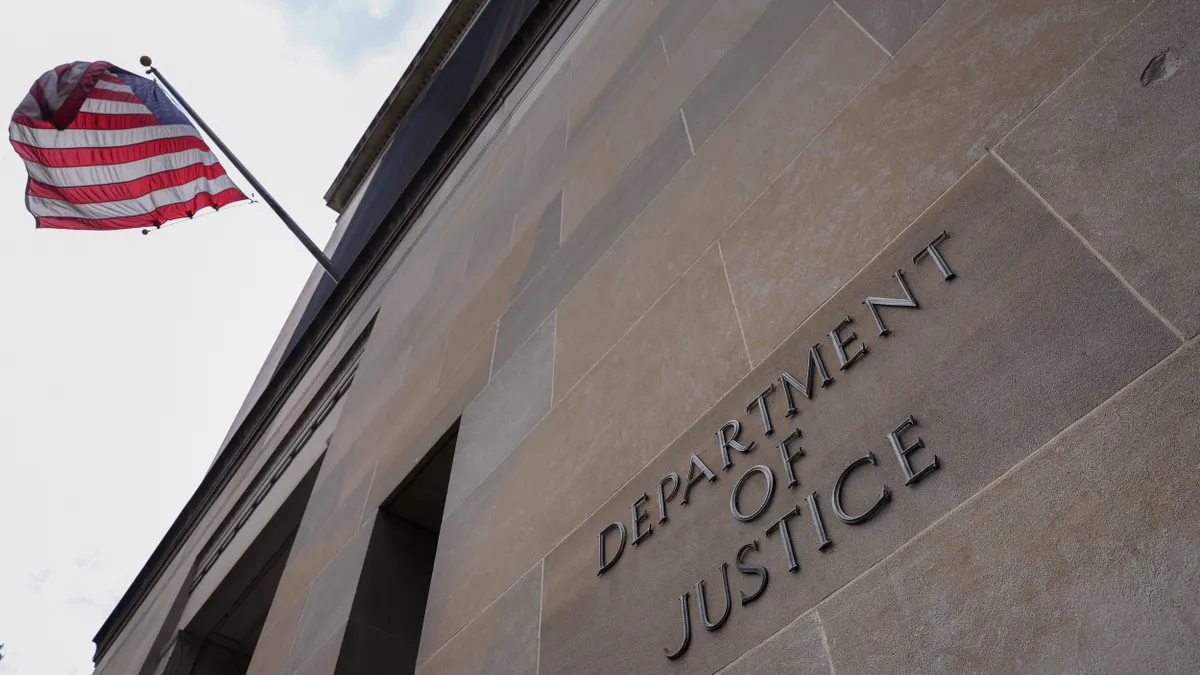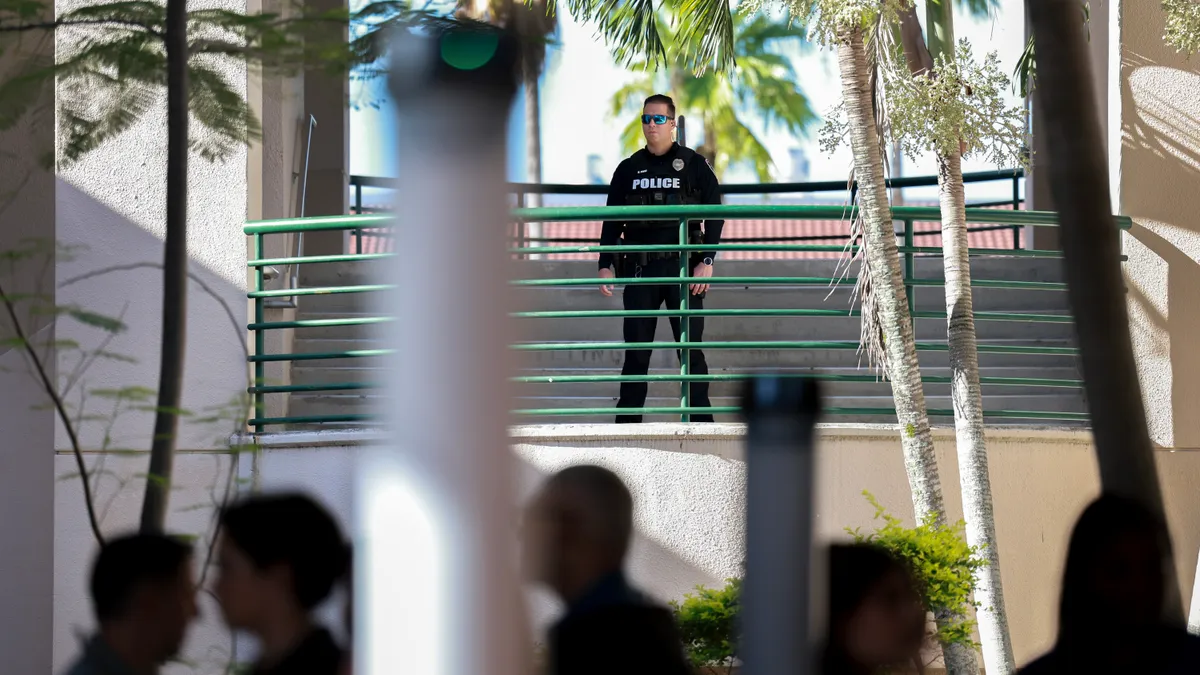Disability advocates in at least half a dozen states are filing complaints in court, arguing statewide policies prohibiting mask mandates discriminate against students with disabilities and deny those students equal access to education.
Some school attorneys and special education experts agree but say as the lawsuits weave their way through the courts, there are proactive steps districts should take to address the individualized needs and safety of students with disabilities.
Jose Martín, an attorney with the Richards, Lindsay & Martín law firm in Austin, Texas, which represents school districts, said he advises districts to have mask policies. Where that’s not possible, he recommends schools consider potential alternatives, such as remote instruction, based on each student’s circumstance. But, he said, even that's not a good alternative.
"If you don't have a mask requirement, you're forcing some vulnerable special ed students to have to do remote learning even if it's not a good learning environment and more restrictive than necessary," Martín said.
In the schools he’s visited in Texas, where there’s a statewide ban on mask mandates, very few are volunteering to wear masks, he said.
The parent lawsuits in Texas and other states argue because there’s no universal mask mandate in schools in those states, students with disabilities, especially those with fragile health conditions, are being forced to make the choice to learn in separate environments, mostly at home through remote learning.
Where that option is available, parents say the synchronous lessons are limited, and that students have less time with speech and occupational therapists and other instructional support staff than their individualized education programs dictate.
Other special education experts say they are hearing of increased bullying against students with and without disabilities who wear masks in schools where masking is not required.
Waterloo, Iowa, resident Jonathan Craig, a father of four, joined a lawsuit there along with other parents because a state law prevents schools from enforcing a mask mandate. In-person schooling is too dangerous for two of his children, who are immunocompromised, and remote learning is not effective.
"Because of my daughter's physical and developmental disabilities, she isn’t able to engage with virtual learning and we’re heartbroken to watch her fall through the cracks,” said Craig, in a statement distributed by the American Civil Liberties Union of Iowa, which filed the lawsuit on behalf of parents and disability advocates.
The legal argument
Plaintiffs in the class action lawsuits against states argue policies forbidding local mask mandates violate Section 504 of the Rehabilitation Act of 1973 and the Americans with Disabilities Act of 1990 and are causing barriers to in-person learning for students with disabilities.
The same laws were cited in the U.S. Department of Education’s Office for Civil Rights announcement of investigations into state policies that prevent schools from enforcing universal mask mandates. Those states are Florida, Iowa, Oklahoma, South Carolina, Tennessee and Utah.
The Texas Education Agency is also under investigation because its mask policy may potentially be discriminatory toward students with disabilities, the department announced Tuesday. The letter to TEA signals that OCR believes limiting districts from making local decisions on masks, based on local COVID-19 transmission data, is inconsistent with the provision of FAPE in the least restrictive environment for in-person instruction for students with disabilities, Martín said.
The initiation of an OCR investigation does not imply a violation has occurred.
Attorneys for school districts and special education experts also predict a rise in special education due process complaints filed by parents on behalf of individual students, on the grounds that bans on mask mandates are denying their children a free appropriate public education under the Individuals with Disabilities Education Act.
In states and districts that restrict universal mask policies, leaders say each parent should have the choice whether their child wears a mask at school. An executive order signed in July by Florida Gov. Ron DeSantis, a Republican, cited research that said there’s a lack of scientific justification for masks in schools.
It also said “forcing children to wear masks could inhibit breathing, lead to the collection of dangerous impurities including bacteria, parasites, fungi, and other contaminants, and adversely affect communications in the classroom and student performance.”
When providing legal guidance to school systems regarding health issues, school attorneys, such as Martín, typically follow recommendations from the Centers for Disease Control and Prevention, which recommends universal masking in schools, as well as state and local health guidance.
"I've always told schools, guide your policies and practices by CDC guidance," Martín said. "It's the safest with respect to nondiscrimination under 504, ADA."
Most K-12 students in the country attend schools where there is a requirement to wear masks or where local districts have flexibility to mandate masks. Only 8.5% of students attend schools where the local district does not have the flexibility to require masks, according to Burbio’s School Mask Policy Tracker.
David Bateman, a professor of special education at Shippensburg University in Pennsylvania, recommends school systems have universal masking requirements, but in some school systems that do, multiple families who oppose mask mandates have transferred to school systems that don’t have this requirement, he said.
Bateman said his advice for universal mask wearing protects students’ health and supports FAPE for students with disabilities who need whole-school compliance, as well as for students whose disabilities prevent them from wearing masks but need everyone else to take this precaution.
“My advice to school districts is, first, they need to be flexible with the needs of the kids who have disabilities,” he said.
Supporting individual needs
Karen Haase, an attorney with KSB School Law, representing schools in Nebraska and South Dakota, said last school year she was helping school districts respond to parents of students whose disabilities prevented them from wearing a mask and wanted to opt out of masking requirements.
This year, much of her advice to school districts is how to respond to parents of students with disabilities who want all staff and students to mask up. In both situations, she has advised school systems to inquire about the requests and determine if individualized accommodations can be made through Section 504 or IEP data-driven decision making.
There could be a variety of accommodations schools and parents can agree to based on each student’s individualized circumstance, she said. For example, a student who needs to wear a mask because of underlying health conditions but attends a school that doesn’t require masks may be able to learn behind a plexiglass shield, be taught only by staff who are vaccinated, or learn with a cohort of other masked students.
Sometimes, accommodations for individual students can lead to whole class changes, such as when one class is prohibited from bringing peanut treats to school for the safety of a classmate who has a severe peanut allergy.
“The smartest thing any of my administrators ever did was to have case-by-case, situation-by-situation decisions, not a system-wide, one-size-fits-all,” Haase said. "I don't think there's any state that has said schools are prohibited from accommodating students' disabilities."
Schools should also be responsive to new diagnoses of student ailments that are the basis of a parent's request to opt out of a mask mandate. Schools should not question the diagnosis but should have a 504 team review of the data to determine if the student truly qualifies for accommodations, Haase said.
When considering accommodations, 504 and IEP teams should review if and how the request relates to a student’s disability, the impact on that student's learning, and how to best serve that child. Schools and parents should begin with how accommodations can be made for in-person instruction, and if that’s not possible, look at the continuum of placements with the least-restrictive environment being the goal.
One of the more restrictive placements is homebound education, a temporary placement for students who are confined to their home or healthcare facility because of a medical condition. In those situations, educators provide lessons in students' homes or may instruct virtually, according to Department of Education guidance.
Claims of mask bullying against a student with disabilities should be investigated by 504 and IEP teams promptly, because bullying may be a violation of FAPE if that treatment is related to a student’s disability, said Bateman and Mitchell Yell, the Fred and Francis Lester Palmetto Chair of Teacher Education and Professor of Special Education at the University of South Carolina.
OCR last week issued a virtual resource binder containing a collection of guidance about non-discriminatory practices in schools, including information on bullying and harassment and long COVID-19 as it applies to Section 504 and IDEA.
Lastly, the attorneys and special education experts advised school administrators to prepare for these issues to continue through this school year and possibly into the next.
“I think schools should buckle in and try to do the best thing for kids,” Haase said.






 Dive Awards
Dive Awards














